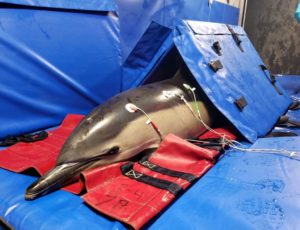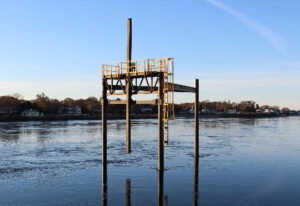
Photo provided by New England Aquarium.
BOSTON – A dead North Atlantic right whale was discovered off the coast of Georgia over the last few days, concluding a sad saga that began in late 2023.
The deceased has been identified as the calf of the right whale Juno, the first calf spotted in Carolina waters during the fall calving season and later spotted with severe injuries to its head and mouth caused by a collision with a smaller vessel estimated to be between 35 and 57 feet long.
Although the mortality event was predicted by experts who examined the wounds, the news of another dead calf has reignited calls for increased measures to protect the critically endangered marine mammals.
According to Oceana, the latest casualty is further proof that an updated vessel speed rule covering smaller boats and stepped-up enforcement efforts are needed to protect the species, as a recent study found almost 80% of ships subject to mandatory speed limits violated them during the period in which Juno’s calf was mortally injured.
“Just weeks ago, we were on Tybee Island mourning the loss of a juvenile North Atlantic right whale that was killed by a boat strike, and here we are again with another preventable tragedy on Georgia’s shores,” said Hermina Glass-Hill, Oceana’s senior field representative in Georgia. “When will this heartbreaking cycle of death end?”
“Juno’s newborn calf offered hope for critically endangered North Atlantic right whales to recover, and because of the human-caused threats they face, that chance is gone,” she added,
expressing frustration with delays in government action.
“Our government already knows what to do to protect these critically endangered whales, so why are they sitting on it? Secretary of Commerce Gina Raimondo and President Biden need to immediately release the updated vessel speed rule their own agency proposed nearly two years ago.”
Studies have found that vessel speed plays a prominent role in vessel-related collisions with North Atlantic right whales, which swim at an average speed of about 6 miles per hour and whose mother-calf pairs spend a lot of time near the surface.
“The Canadian and U.S. governments must do more to protect this critically endangered population, including mandatory vessel slowdowns across their full migration route and a swift transition to ropeless and on-demand fishing gear to protect whales and Canada’s access to lucrative U.S. seafood markets,” said Kim Elmslie, campaign director at Oceana in Canada.
“Failure to do this essentially guarantees their extinction before our eyes.”























